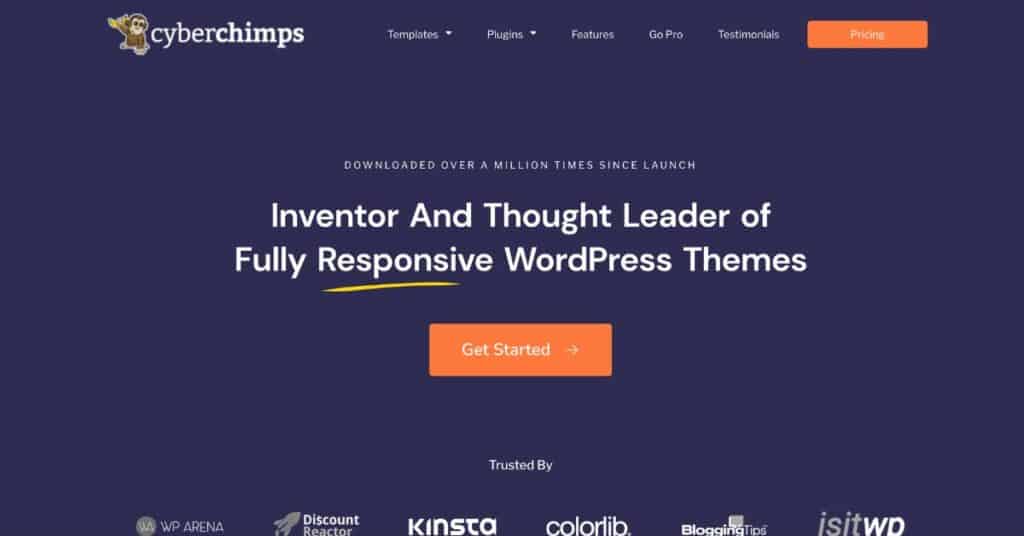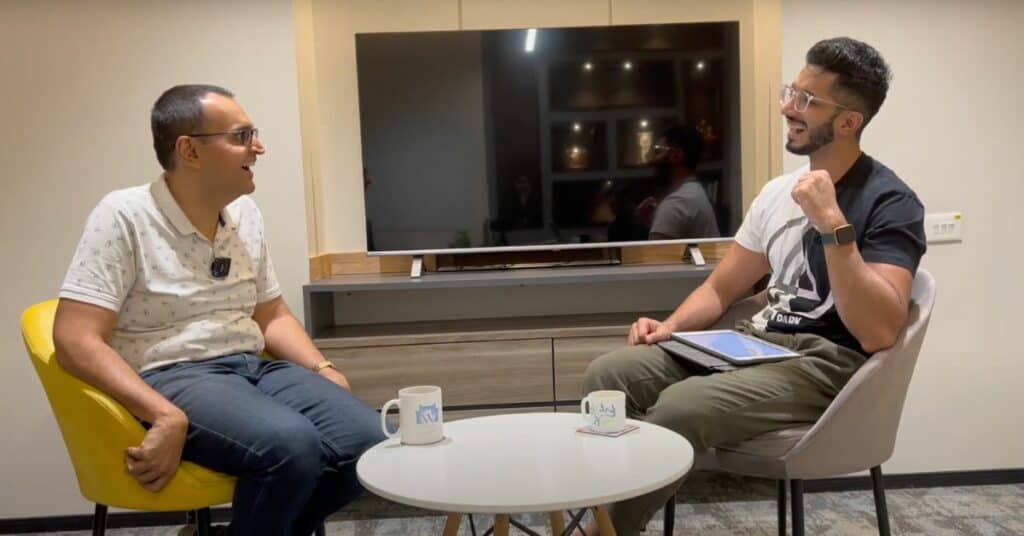In this article, you will find a video interview featuring Karthik Magapu, where he shares his WordPress journey. Karthik is known for his impressive range of products, with CyberChimps being one of his notable achievements. He is the founder of Hummingbird Web Solutions and HumCommerce. What sets him apart is his extensive knowledge and experience in the fields of marketing, development, and sales.
The purpose of conducting this interview was to uncover valuable insights from Karthik on starting a company. His emphasis on the importance of product building is truly commendable, stemming from his own experiences. He motivates aspiring entrepreneurs by highlighting that while money may not be the key factor in starting a business, consistency and making the right decisions hold the utmost significance.

Guest Name: Karthikraj Magapu
What They Do: Karthikraj Magapu,is the founder of CyberChimps
Company: CyberChimps, Hummingbird Web Solutions, HumCommerce
Known For: Karthik is known for his impressive range of products, with CyberChimps being one of his notable achievements. He is the founder of Hummingbird Web Solutions and HumCommerce where he helps e-commerce retailers build their stores from the ground up.
Social Media:
Audio Podcast with Karthik Magapu
Here’s the video of the interview with Karthik Magapu.
Video Interview with Karthik Magapu
Video interview is in Hindi language with English Subtitles.
Interview with Karthik Magapu
Karthik, who are you, what do you do, and how did you start this journey? Please share this with my audience.
Karthik: My name is Karthik Magapu, and I own, run, and host WordPress Products. We create themes, plugins, and products that help people build digital websites and their own businesses. We have been in this business for around 12-13 years, starting in the year 2011. Our team is 80 people strong and based in Pune. All of our customers are from around the world. They come to our website, buy our products, and use them to make money and build their own businesses. This new business model has flourished in the last few years, and we are embracing it.
Karthik, what’s your most famous product till now?
Karthik: Our most famous product is the CyberChimps Responsive Theme. It has gained a lot of popularity, but we believe there is still a long way to go. Our products are doing well, and we have ambitious plans to grow and make them even more popular.

How did you get the idea to venture into this field? Could you share your journey with us?
Karthik: I was working in a large IT company for 10 years from 2001 to 2011. After gaining a substantial amount of experience in the industry, I felt the urge to explore my entrepreneurial side. So, I resigned from my job and began searching for individuals who were willing to join me on this journey. Together, we started our own company in 2011.
What was your first business venture like?
Karthik: Our first business was a small acquisition. We came across a product being sold by a theme developer in the US who no longer wanted to run and maintain it. We saw potential in the product, so we acquired it and started marketing and selling it.
Acquisitions can be an interesting strategy. How do you approach the businesses that you acquire?
Karthik: Many businesses have been involved in acquisitions, but our approach is slightly different. Once we acquire a business, we focus on growing and nourishing it. We invest our efforts in expanding its reach and enhancing its offerings to provide more value to our customers.
What is your background in, development or marketing?
Karthik: My background originally lies in development. However, over time, I ventured into sales and eventually took on management roles. I believe having experience in multiple areas has helped me understand the different aspects of running a business.
Can you share the turning point for your business? When did you realize it was flourishing and that you could turn it into a real company?
Karthik: My story is a bit different from those who start their businesses at a very young age. When I initially started my company right out of college, I faced numerous challenges. I struggled financially and had to eventually shut it down after 4-5 years.
After that, I joined Infosys and worked there for 10 years. It was during this time that I gained more knowledge about the industry. When I decided to start my own company again, I was more cautious. I wanted to ensure that I did it right this time and didn’t face the same fate as before.
So, I started with a small amount of money. I made sure that the people I worked with shared my vision and were committed to growing the business alongside me. I believe that building a strong team is crucial for success. So, I focused on finding individuals who believed in our mission and were passionate about what we were trying to achieve.
You mentioned that you started with a small amount of money. Could you share more details about the initial capital you had while starting your company?
Karthik: Sure. You don’t always need a large amount of money to start a business. In my case, I began with around 4-5 lakhs. It was a modest amount that allowed me to cover rent for a few months and hire the necessary talent.
I also set aside some money for small acquisitions. This approach allowed me to shape my current business model, which is quite different from a traditional startup model.

Considering your past failures, what gave you the courage to enter into this field again?
Karthik: Interestingly, the courage to try again came from my first failure itself. As they say, the fear of something is often worse than the event itself. Although I experienced setbacks, I realized that life didn’t end because of them. It gave me the confidence to try again and pursue my entrepreneurial aspirations. In fact, I felt a sense of regret for having wasted ten years of my life in a job that didn’t fulfill me!
“The fear of something is often worse than the event itself.“
Karthik Magapu
Can you share a particular time when your business reached its peak stage?
Karthik: Our journey has had its fair share of ups and downs. We don’t see our success as a sudden jump or a peak stage. Rather, it has been a steady increase over time. We believe in continuous improvement and sticking with our goals. It’s about consistent progress.
Seeing our progress and growth over the years is incredibly motivating for me. Knowing that we are constantly improving and achieving better results than before gives me the drive to continue pushing forward and taking our business to new heights.
What are your thoughts on the progression of AI and specifically ChatGPT? How is your company approaching it, and what are your personal opinions on its usage?
Karthik: I believe AI, including tools like ChatGPT, is a wonderful and powerful tool. It serves as an amplifier for human capabilities. Just like how bicycles allowed us to travel farther and vehicles revolutionized transportation, AI has the potential to handle complex tasks and process vast amounts of data that would be challenging for humans alone.
The fear everybody has is about AI replacing humans. But let me quote a lovely statement I heard regarding this – “AI will not replace you. Some human using AI will replace you.” One smart human who knows how to use AI will eventually replace 4 humans.
At our company, we embrace the power of AI. We see it as a valuable resource and encourage everyone to utilize it to its fullest potential. We seek assistance from AI whenever possible, leveraging its capabilities in our business and work processes. There’s no shame in using AI unless it involves unethical practices like copying articles. Instead, we recommend fully leveraging AI to learn from it, improve our efficiency, and enhance our products and services.

“AI will not replace you. Some human using AI will replace you.”
Karthik Magapu
Now, can you share how you are incorporating AI into your business and products, or if you have any plans to integrate it further?
Karthik: We are actively exploring ways to incorporate AI into our business and products. AI has a lot of potential applications that we are exploring. One area where we see AI playing a significant role is in customer support. We can utilize AI to provide efficient and personalized support to our customers.
Additionally, AI can be used for content suggestions, helping us enhance our SEO strategies and improve the overall user experience. The SEO landscape is constantly evolving, and AI will undoubtedly be a game-changer in that field. While our current products are not AI-enabled, we are actively discussing and planning for their implementation in the future.
AI can indeed revolutionize various aspects of business operations. Now, shifting to personal use, how do you incorporate AI into your personal life? Are you using it for tasks like email management?
Karthik: Personally, I find AI to be a valuable tool in my daily life as well. For example, just a few days ago, I had my 13-year-old daughter set up ChatGPT. I asked her to consult the AI model first before coming to me with questions. It was an interesting experiment to see how she could leverage AI to find answers and then apply her own critical thinking to analyze the information. It’s similar to the transition from pen and paper to computers.
I encourage using AI in personal life, asking random questions, but not merely copying the answers. AI only saves you the time you would’ve spent on research. So, it’s important to read and understand the responses, and apply our own judgment to make informed decisions.
Karthik, does the way AI is progressing scare you?
Karthik: Yes, it definitely scares me. It’s like being on the top of a water slide, both exciting and terrifying. Once you’re on the slide, there’s no turning back—you have to move forward. AI’s rapid advancement brings a mix of excitement and fear for me. However, it’s important not to let fear hold you back. Fear can bring out the best in us when channeled in the right way.
For me, the fear lies in not innovating with AI and being left behind by competitors. I fear that if we don’t leverage AI, the cost of our work will rise, and we may make more mistakes than necessary. So, it’s crucial to be driven by fear and use it as motivation to seize the opportunities AI offers.
“Fear can bring out the best in us when channeled in the right way.“
Karthik Magapu
I heard that you have built a team of 80+ people and have a large office in Pune, Maharashtra, India. Could you tell us more about it?
Karthik: Certainly! We currently have a team of over 80 talented individuals, and our office in Pune, Maharashtra can accommodate up to 150 employees. We have plans to expand our team further in the coming months and hire an additional 50-60 people over the next six months. Our goal is to strengthen our workforce and meet the growing demands of our business.

Karthik, How do you go about hiring new team members?
Karthik: Hiring is a crucial process for us. It is indeed another facet of customer acquisition or sales. Many people often think that sales is tough while hiring is easier. When you hire, you’re essentially selling your company, your brand, and the opportunity for individuals to invest their time and careers with you. Just like selling a product, you’re telling people your company’s story and the value you can add to their professional journeys.
Hiring should always be approached with the mindset of a salesperson. Your recruiter and salesperson are essentially playing the same role. We’ve experienced first-hand that when we hire the right people, our business becomes easier, and the team feels more comfortable. On the other hand, hiring the wrong people can make the business more challenging and create discomfort within the team. Finding the right balance is crucial. You can’t hire too many, too few, or the wrong individuals.
“Hiring should always be approached with the mindset of a salesperson.”
Karthik Magapu
As your company continues to grow, how do you manage your expanding team?
Karthik: Managing a team becomes more complex as it grows, but fortunately, my experience of working for 10-11 years in Infosys taught me valuable management techniques. I learned about team structures, points of responsibility, the role of managers, and the role of individuals within the team. We leverage the rich learnings and best practices we gained from Infosys to guide our team management.
Interestingly, the failure in my previous business turned out to be a blessing in disguise as it led me to acquire knowledge and skills that I now apply to manage our team effectively. I see it as falling from a bicycle and realizing that avoiding riding it again won’t solve anything. It’s important to learn from failures and apply those lessons to future endeavors.
What do you think motivates your team? Is it primarily the monetary aspect, the learning experience, or a combination of factors?
Karthik: When we started the company, the primary motivation for the team members was a steady salary. Having a predictable income every month provided job security, which was a significant factor. Additionally, the quality of work and work-life balance were also important considerations, ranking as the third and fourth factors, respectively. This trend continued for the first 6-7 years of our journey.
However, in recent years, I’ve observed while a steady and predictable salary is still appreciated, it is no longer the number one priority. The main motivating factor is the quality of work and work-life balance. People are seeking meaningful and impactful work that allows them to make a difference. They want to be heard and contribute their ideas.
Additionally, a sense of belongingness within the organization has become increasingly important. However, today, people are confidently exploring new avenues and seeking environments where they can truly thrive.

Moving on, I’d like to discuss your team structure. Do you have an offline team or an online team?
Karthik: Our team is entirely offline, meaning we work together in an office setting. Working remotely posed numerous challenges for us during the COVID pandemic. Although I’m a fan of working remotely, I believe we haven’t cracked the code of making it effective for all our employees yet. Being physically present in the office allows for better collaboration, learning from one another, and socialization.
Let’s discuss the impact of the COVID-19 pandemic on your business.
Karthik: The pandemic had a significant impact on our team. We experienced the loss of team members due to family pressures and personal challenges. This churn within the team was one of the consequences of the pandemic. Additionally, our focus on customers was affected during that time.
However, the situation also allowed us to pause, reflect, and think about our business. It allowed us to spend more time with our families, which offered a different perspective. Overall, we learned valuable lessons from this experience and have been able to apply them to our business moving forward.
What are your opinions on earning money? How much should a person ideally earn?
Karthik: My perspective on this is quite simple. I believe the ideal objective in life is to become a billionaire. To me, a billionaire is someone who spends less than they earn. The key is aligning your desires with what you can afford. It may seem like a lot of self-restraint or limiting oneself, but the reality is that desires have no end.
For me, earning enough money means being able to afford whatever I want. Of course, there may be some things that I think I could have done if I had more money, but that doesn’t fully motivate me. I encourage people to set a baseline for their desired earnings and then figure out how to achieve that. Nowadays, with the opportunities available, it is not as difficult as it may seem.
Do you think there might be compromises in terms of work-life balance if one sets the bar too high for their desired earnings?
Karthik: Absolutely, that’s a valid point. When you set the bar too high for your desired earnings, there is a possibility that you may need to make compromises in your work-life balance. It’s a common saying, “Be careful what you wish for because you may get it, but you may not know the price you pay for it.” Many people have aspirations for financial success, and they work hard to achieve it. However, it’s essential to consider the potential trade-offs that come with it.
After 20 years of working tirelessly, earning a lot of money, and achieving success, one may realize that they missed out on spending quality time with loved ones or pursuing their passions. Today, it’s not just limited to traditional career paths like becoming a doctor, engineer, or coder. People can now explore alternative avenues that align with their passions.
For example, food blogging, video blogging, and various other online platforms allow individuals to monetize their hobbies and interests. The internet has opened up endless possibilities for earning income while following one’s passions, traveling, and meeting new people.
Be careful what you wish for because you may get it, but you may not know the price you pay for it.
Karthik
It’s not just about conventional career paths anymore. However, looking back on your own life, do you have any regrets?
Karthik: I must admit, there are a couple of small regrets that come to mind. One significant regret is leaving my own company and starting a new job. In hindsight, I realize that I could have learned many more valuable lessons and grown further if I had stayed with my company. However, I also acknowledge that the job I took taught me several important lessons as well.
The key takeaway here is that if you find yourself feeling stuck or dissatisfied, it’s essential to figure out a way to overcome the challenges rather than simply giving up and switching paths altogether.
If you were to receive a substantial amount of money, let’s say $20 million, what would you do with it?
Karthik: Well, I am a quite traditional person, So, if I were to receive $20 million, I probably won’t buy a Ferrari or some expensive car, I’ll probably keep it in a fixed deposit! Jokes apart, I’d probably invest a significant portion of it to ensure long-term financial security and donate the rest to charity.
Are there any new tools or ideas that you’re planning to invest in?
Karthik: In my opinion, when it comes to starting a new business, financial resources are not the first priority. It’s important to possess a certain level of madness, fearlessness, and a burning passion to make the business a success. Investors and people with money are constantly searching for individuals who possess that fiery passion.
So, if I were to come across someone with a great business idea and the drive to pursue it, I would be more than willing to invest in their venture. The truth is, money itself is not the primary obstacle. It only becomes a blocker if you believe it is. It’s about finding that passion, building a solid business idea, and taking small steps toward its realization. Once you demonstrate that commitment, the universe has a way of providing the necessary financial support.
“Money itself is not the primary obstacle. It only becomes a blocker if you believe it is.”
Karthik

How do you manage your personal life alongside your professional responsibilities?
Karthik: Managing my personal life alongside my professional commitments has been a learning experience. But I have found that when you genuinely enjoy your work and feel motivated, managing your personal and professional life becomes much easier.
Stress tends to arise when there is a conflict between what you enjoy and what you are doing. However, I don’t feel guilty if I need to leave early to attend my children’s functions or handle a medical situation. I understand that balance is essential, and sometimes I need to allocate more time to work and other times to my family. As long as I am spending quality time with my loved ones, I feel content and fulfilled.
I would say work-life balance is not something to be measured by the number of hours but by the quality of time, you spend at work and with your family. It’s about finding that sense of fulfillment and satisfaction in both areas and ensuring that you make the most of every moment.
“Work-life balance is not something to be measured by the number of hours but by the quality of time, you spend at work and with your family.”
Karthik Magapu
What investment strategies do you follow?
Karthik: Apart from fixed deposits, I believe in investing in good companies through equity. However, it’s important not to invest simply because the share prices are low. The biggest mistake people make is assuming that cheap shares will automatically increase in value. The reality is that a share may be inexpensive because the company is on the verge of bankruptcy.
Instead, it’s crucial to evaluate the company’s potential for growth and whether its share price has the potential to increase. Invest in companies that show promise and have a solid business model. Personally, I mostly reinvest in my own business. I invest in people, customers, marketing, and sales. We haven’t raised money from external sources; we primarily rely on the funds generated from our customers or my personal investments when a business opportunity arises.
As with any business venture, there are bound to be losses. Have you experienced any significant losses throughout your career?
Karthik: Yes, we have experienced losses in our journey. One of the most significant losses we faced was when we acquired a business that unfortunately shut down shortly after. All the revenue we expected to generate from that acquisition vanished, and the money we had invested went to waste.
Losses come in different sizes and values. Sometimes it may be a loss of a few lakhs, and other times it may be a higher value. However, what I have learned over the years is that we tend to react negatively to losses regardless of their magnitude. We often overreact to even small losses, which can prevent us from focusing on more substantial opportunities.
So, I believe in the Economics principle of Sunk Cost. It just states that losses don’t define our path; it’s about how we move forward and create more value. The same principle applies to profits as well. Celebrating a profit is not enough; we need to constantly look ahead and seek new ways to grow.
Have you felt any impact from the recent recession?
Karthik: No, I don’t believe these macroeconomic trends have a direct impact until you reach a revenue level of $15 million, $20 million, or $30 million. If you develop a product that is fairly priced and in demand, the internet ensures that people will buy it.
What’s your advice to someone entering into the product business right now?
As for advice for someone entering the business now, I have several recommendations. First, create a proper plan in your mind. Instead of relying on MBA books, tap into your own creativity and strategize how you will generate revenue. Assess if you have the necessary funds for your venture and determine which functions you can personally contribute to.
Building a product is a complex task, and profitability isn’t always immediate. Many products are built but ultimately abandoned. If you’re truly passionate about your product, assemble a diverse team of individuals with expertise in technology, marketing, and finance. It’s rare to find one person who possesses all these skills, so consider finding a friend, partner, or co-founder who can fulfill those roles.
Having a lot of money isn’t the sole factor in product development, but having critical skills is crucial. Your product decisions should be based on the available funds. If you have limited resources, focus on developing a product that can quickly generate sales and revenue. However, if you have substantial funds, you can afford to invest in research and development (R&D) and create a product with a longer sales cycle.
There can be significant rewards, but also substantial risks. I strongly advise against taking loans for product development. It’s important to carefully manage your finances and leverage your available resources wisely.
Is product building a riskier business compared to offline or offline ventures?
Karthik: I don’t believe it is riskier. It carries a similar level of risk as other businesses. It’s just that if you can’t see the risks, it may appear less risky. Once you find a way to navigate those risks, it becomes easier.
What was the most challenging moment in your journey?
Karthik: There have been many challenging moments throughout my journey. In business, you often face unforeseen challenges that are beyond your control, leading to frustration. For example, malware attacks on our website or financial attacks. Hacking attempts and successful hacks have also occurred. Fortunately, we had backups and could recover. These experiences teach us how things can go wrong.
Challenges arise every year, and at times, I feel scared. However, I remind myself and my team that we have overcome worse situations. I say to myself that we haven’t caused harm to anyone—it’s just a simple loss of money! It’s not something worth getting depressed over. Our brains tend to magnify issues, but after a few days, we realize they weren’t worth the stress.
What is the worst advice you’ve received?
Karthik: I’ve received plenty of bad advice. One of the worst was being told, “Don’t be a fool to start a company.” People often highlight the safety, security, and perks of a 9 to 5 job, making it seem easy compared to starting a company.
Another bad advice I’ve received is, “It won’t work.” Most of the time, when people say something won’t work, it stems from their own negative experiences or lack of knowledge. They don’t truly know whether it will work or not.
It’s important to be cautious when seeking advice, especially from respected or trusted individuals. Their opinions are just that—an opinion. The worst advice you can give or receive is to dismiss an idea as impossible because, under the right circumstances, anything can work.
What is your life philosophy in three words?
Karthik: “Enjoy Life’s Ups and Downs.”
When you’re experiencing success, embrace and enjoy it. When facing challenges and setbacks, remember that the ups will come again. The joy of an up after a down is truly rewarding.
If you could change something, what would it be?”
Karthik: I’ve come to realize that you cannot change a single thing in the past. It’s a scary thought. You can’t assume that only one specific thing will change while everything else remains the same. So, I’ve learned to appreciate the finality of the past. I have no desire to change it, but I do want to make changes in the present to shape a better future.
What do you hope to change in the future?
Karthik: Using the lessons from the past that I cannot change, I want to take action in the present to create a better future. This includes making informed decisions in my business, health, and family life.
Where do you see yourself in 5 years?
Karthik: To be honest, before answering that question, let me provide some background. We recently celebrated our 12th anniversary, but it doesn’t feel like 12 years have passed. It feels like just yesterday that we started in 2011, and now it’s already 2023.
So, I envision myself continuing to do what I enjoy for the next several years. I see myself learning from today’s mistakes and venturing into something different and on a larger scale. There will be excitement, fear, and joy as we embark on new endeavors. It’s about being genuinely excited. It’s like asking, “Which movie would you like to watch in 5 years?” The answer is, we don’t know yet, but we will definitely be watching a good one.
What’s your worst nightmare?
Karthik: A few years ago, I came to the realization that health is of utmost importance. You can buy assets and wealth, but without good health, it all loses its value. So, my biggest nightmare revolves around suffering from poor health. To prevent that nightmare from becoming a reality, I am committed to taking actions that prioritize and safeguard my health.
How do you feel today, considering your journey from your first company to now in 2023?
Karthik: I feel incredibly great and grateful. My gratitude doesn’t stem solely from achieving success or acquiring material things. Throughout the ups and downs, I am grateful for the ability to look toward the future and reflect on the past. I’ve learned that regretting the past is futile. I’m filled with excitement for what lies ahead, but I also recognize a healthy level of fear. It’s a combination of emotions that keeps me motivated and focused.
Do you consider yourself lucky?
Karthik: Absolutely, luck plays a significant role. However, I believe that you need to “buy the lottery ticket” to have a chance at winning. You can’t sit at home expecting to win without making an effort. The same applies to business.
Starting a business, launching a product, hiring talented individuals, and building relationships with customers are all like buying lottery tickets. You have to keep investing and taking chances. Some will yield zero returns, but some will bring immense rewards. The key is to continually improve yourself so that one day, you’ll break through.
Do you have any last points or advice for someone who is starting their own business?
Karthik: One crucial piece of advice I have is not to let people discourage you. Many people will tell you it won’t work and that you won’t succeed, but don’t let their negativity deter you. Learn from your mistakes, but make sure you start something that you truly understand. Avoid getting caught up in trends and hype. Keep it simple and focus on building a product or service that fulfills a genuine need and that customers are willing to pay for.
The key lies in understanding what people want and creating a product or service that addresses their needs. Building a business doesn’t have to be complicated. It’s about offering something valuable that customers are willing to exchange money for. Don’t overcomplicate it. Start with a clear understanding of what you’re providing and ensure there is a demand for it.
Building something that people want and are willing to pay for is at the core of a successful business. If you keep that in mind and constantly strive to deliver value, you’re on the right track.
“Build something that people want and are willing to pay for.”
Karthik
Conclusion
This interview with Karthik has provided us with valuable insights into his approach to life, business, and products. There are numerous key takeaways from our conversation, including his perspectives on effective team building, hiring the right people, and the elements necessary for building a successful business. One of the standout qualities about Karthik is his honesty in expressing his thoughts, which made the interview an enjoyable and enlightening experience covering a variety of topics.
Karthik is widely recognized for his impressive range of products, with CyberChimps being a notable achievement. What sets him apart is his extensive knowledge and experience in marketing, development, and sales.
The primary goal of this interview was to uncover valuable insights from Karthik regarding starting a company. His emphasis on the significance of product building is truly commendable, stemming from his own experiences. He inspires aspiring entrepreneurs by emphasizing that while money may not be the sole determining factor in starting a business, consistency and making the right decisions hold the utmost significance.
We would love to hear your thoughts on this interview. Please feel free to share your feedback in the comments below.
